- Home
- Cynthia Hand
My Calamity Jane Page 3
My Calamity Jane Read online
Page 3
She loved her family, liked sewing pretty dresses, and wanted to build a good life for herself and those she cared for. But the way she went about those things was somewhat, ahem, not regular for a sixteen-year-old girl living in Darke County, Ohio, in 1876.
Back up a few days from the last two chapters and take this touching family moment for example:
Imagine a sprawling farm (deeply in debt, but still growing food—just not quite enough to get the family through winter), and a farmhouse (packed tight with siblings), and a mother and daughter working together in the kitchen, having what most folks would consider a pretty serious argument.
“I’m not getting married!” Annie glared at her mama, who was kneading bread on the table.
“Yes, you are!”
“No, I’m not!”
“Yes, you are!”
“You’re not the boss of me!”
“I am so. I’m your mama.”
Annie grimaced. Mama had a point there. But still, Annie’s refusal stood.
“I’m not getting married.” She shoved her hands back into the rabbit she’d hunted earlier and was cleaning now. “And you can’t make me!”
“Don’t talk back to me, young lady, and don’t begin a sentence with a conjunction.” Mama worked the dough harder and harder. The bread was going to end up a rock if she wasn’t careful. “We all need to do what’s best for the family, Phoebe Ann, and for you, that means getting married.”
Annie finished quartering the rabbit, trying not to make a mess of the task simply because she was upset. These weren’t Mama’s words—well, some of them were. Mama had always been invested in her daughters’ romantic attachments (or in Annie’s case, the lack thereof), but lately, her mama’s interest had turned into obsession.
“But you need me here,” Annie insisted.
“I have Grandpap Shaw now,” Mama said. “You know he loves to take care of things.”
Oh, Annie knew her new stepfather liked to take care of things. Some might even go as far as to call it controlling. Those same people might even think it was weird that everyone—even Mama—had to call him Grandpap Shaw, as though he were their grandfather. At age seventy-four, he was certainly old enough.
Annie clenched her teeth, caging her sharp retort. She didn’t want to fight again.
It was just . . . Annie was supposed to be the one who took care of things. From the time that she was little more than a toddler her pa had brought her along when he went trapping and fishing. Annie was a fast learner and loved the outdoors, and after her pa had died in a sudden snowstorm ten years ago, Annie had been using those skills to keep her mother and siblings fed and clothed. And she’d been doing an excellent job of it.
“If I got married, I’d have to take care of my own family,” Annie pointed out. She didn’t intend to create her own family, but that was an argument for another day. “Then I wouldn’t be able to help you at all. But with my game and the money Mr. Frost pays for what I send him—”
“All that shooting isn’t feminine. Really, Phoebe Ann.” Mama shook her head and continued kneading the dough. “You should be seeing about marrying that Mr. Frost, not selling him dead animals.”
“Mama!” Annie turned around, horrified. “He’s near forty years old! He’s ancient”—(at this point, your faithful and likewise ancient narrators die inside)—“and he’s already married.”
Annie’s mama bristled at the age comment (she’d recently married a man who was twenty-eight years older than her, after all), but then sighed and bustled out of the kitchen. Annie sighed, too. She loved her family, she did, but no one—least of all Grandpap Shaw—seemed to understand how hard Annie worked to keep the farm. They still owed about a hundred dollars on it, and that wasn’t going to change if Annie got married. What she needed was a job, a regular-paying, honest-to-goodness job, but there weren’t many jobs for a girl with Annie’s very particular set of skills.
“Annie!” Her sister Huldy skipped into the kitchen and laid a newspaper across the table. “You’ve gotta see this.”
Annie washed her hands and hurried over to the paper. “A dog?” she asked, looking to the advertisement where Huldy was pointing. “I’m sorry, but you know we can’t have one.” Even thinking about dogs made her nose itch and her eyes water. She could almost feel a sneeze coming on.
“No!” Huldy moved her finger over a section. “I mean this one.”
“Oh!” Annie sniffled in relief. “All right. Read it to me.” Annie and her siblings might not make it to school every day—there wasn’t usually enough time—but Annie liked to make sure they all practiced their numbers and letters, and the newspaper was one of the best textbooks they had.
“It says, ‘Wild Bill’s Wild West: coming to Cincinnati at the Coliseum Theater! See the magnificent feats of Wild Bill Hickok, the legendary gunslinger, along with Frank Butler, the Pistol Prince, and Calamity Jane, the Heroine of the Plains.’”
A sharpshooting show! Starring Wild Bill! Annie had read everything she could get her hands on about Wild Bill Hickok. Seeing his show would be a dream come true.
“What’s all this?” Mama and Grandpap Shaw came in, followed by Sarah Ellen holding baby John, to find Annie and Huldy hunched over the paper.
Grandpap Shaw glanced at the advertisement. “Show business. Pah. It’s one thing for a man to go out and shoot for his supper, but when he puts on a fancy hat and does it for entertainment? It’s downright unseemly.” He looked pointedly at Mama.
Mama nodded, quiet now that her new husband was here to do the talking for her. Annie felt a pang of yearning for the way life had been before. Sure, they’d been poor in material things but rich in other ways. There’d been late nights when Mama had taught Annie to sew by the fire, cozy hours spent making plans for what to plant in each field or how to get through the winter, laughing and joking and simply enjoying each other’s company. But since the wedding, all that had changed.
Annie’s jaw tightened. She picked up the newspaper and read the advertisement again. They wanted spectators, not another sharpshooter, but maybe . . .
“What are you thinking?” Huldy whispered. She always knew when Annie had something in mind.
“When I was out hunting today, I shot the cap off a mushroom from fifty paces. And I shot the fuzz off a caterpillar from twice as far.”
Huldy nodded, her skinny face glowing with pride. “There’s no trick you can’t do, Annie. I bet you could outshoot that Pistol Prince, no problem. You should join their show. Annie Mosey, the best sharpshooter in Ohio! All your shows would sell out.”
The words stirred something inside Annie—a sense of adventure and importance she’d hardly allowed herself to acknowledge before. She really should be in the Wild West show, she thought. Why not?
“There will be no more talk of show business in this house!” Grandpap Shaw said. “If you want to help the farm, then you’ll think about getting married, like your mama and I did.”
Annie pressed her mouth into a line to trap her disagreement. People liked shows, and she was really—we mean really—good with a gun.
Mama moved to the counter to finish supper. “Sarah Ellen, set the table. Huldy, clear your newspaper away. And Phoebe Ann?”
Annie didn’t suggest that she not start a sentence with a conjunction.
“Stop thinking about running off to join a show.” She wrinkled her nose with utter distaste. “You can’t get a man with a gun.”
“I don’t need a man, Mama. I have a gun.”
“Quit your daydreaming right here,” Grandpap Shaw said. “The show isn’t even looking for help. They have a show. You’d only be in the way. No daughter of mine . . .”
But Annie had stopped paying attention three paragraphs ago. She was going to do it. She was going to join the show. She was going to make her fortune, and then they would never have to worry about money again.
She was already planning what to pack, how much game to leave with her family, and what she’d
do if this didn’t work out.
Wait, no. Scratch that. It would work out. Annie would make it work out. Because the only thing Annie didn’t know how to do was take “no” for an answer.
Her plan was simple: take the train to Cincinnati, stay at the Bevis House, where she’d sent ahead word to Mr. Frost that she was coming, and go see the Wild West show for herself. After that, she’d know what they were lacking, and she’d figure out how to persuade the company what they were lacking was her.
Mr. Frost met her at the station. On the way back to his hotel he gave her a cursory tour of Cincinnati—enough to help her get her bearings. It was the biggest city she’d ever been to, but Annie had a knack for finding her way. Even as a child, on the run from the Wolves— Well, more about that later. Suffice to say, Annie was almost never lost.
The hotel was grand, lording its four stories over the corner of Court and Walnut Streets, and when Mr. Frost led her to a beautiful room on the topmost floor, she had to protest.
“This is too much!” A colorful rug covered the hardwood floor, the furniture was all solid oak and polished silver, and the bed was big enough for Annie and all three sisters. “I can’t accept this.” She couldn’t pay for it.
“Nonsense, dear.” Mr. Frost put her trunk down at the foot of the bed. “This is your first trip into the big city. Allow me to make it a memorable one.”
Annie was so grateful she was at a loss for words.
“Now, I’ve acquired tickets for the show. We’ll go this evening, at eight, if that’s all right with you. And tomorrow, Mrs. Frost wants to take you to the local shops and give you a taste of city life. See if it’s to your liking.”
“That’s very kind.” Annie didn’t have enough money to buy anything, but she would have fun looking. Well, maybe if she skipped a meal or two, she could buy Huldy some paints, or Sarah Ellen some fabric. And if she got the job—no, when she got the job—she’d be able to buy something nice for herself, too.
“I’ll leave you to unpack. Come downstairs when you’re ready for supper.” Mr. Frost left the room, whistling.
Annie grinned and got to work putting her belongings away. Then she came to the gun case that held her father’s old Kentucky long rifle.
Annie had taught herself to shoot at only eight years old. When she’d loaded and aimed out the window, the force of the blast had knocked her back and across the room. But she’d killed the squirrel she’d been aiming for, and that was what they’d eaten for supper that night.
She’d only gotten better from there.
She opened the case just to look inside. This was her ticket to a better life. This was the way she’d ensure her family’s survival. This was the way she’d convince her mother of her ability to provide for herself—without a man.
Carefully, she closed the case and locked it, then laid a hand on the wood.
(Hey. It’s us—your narrators. You may have noticed that our characters have what some might call an unhealthy obsession with guns. This was a symptom of the time—guns were becoming more easily available in America after the Civil War, shifting from the basic rifles that people used to hunt and defend themselves to flashier revolvers and six-shooters, a situation that, coupled with rampant alcohol use, lent itself to more of a gun-happy “shoot ’em up” mentality and a rise in death-by-gun violence. The problem was becoming so bad that many towns were demanding that people turn in their guns to the sheriff before they were allowed to enter. Well, thank goodness we’ve got that problem solved now. Right?
Oh. Wait.
Anyway, we, your faithful narrators, would like to reassure you that no real live humans were harmed by firearms in the writing of this book.)
After a while, Annie went downstairs for supper, but she wasn’t halfway through the lobby when she spotted three very impressive—very recognizable—figures. (And two others standing with them.)
The first was Wild Bill Hickok, and she knew him because of the broad black hat, long hair, and signature coat he wore. He and another man were in discussion with Mr. Frost, asking about transportation. A third man—a scrawnier fellow with a permanent smile—stood apart from them but watched them closely.
Then there were the other two: Frank Butler and Calamity Jane. They were both tall and carried weapons, but the similarities ended there. Where Mr. Butler was put together—wearing a fine jacket and polished black boots—Miss Calamity looked intense with her mud-spattered buckskins and unkempt black hair. They made quite the interesting pair, Annie thought, gently elbowing each other, bickering in the same sort of friendly way Annie and her sisters did.
Annie stood there, starstruck. She’d come to see these people, and here they were. Mr. Frost hadn’t said a word about them staying at his hotel. What were the odds?
“Your carriage will be around right away, Mr. Hickok,” said Mr. Frost. He was smiling coolly, as though he met celebrities such as Wild Bill Hickok every day. And with this fancy hotel, maybe he did.
When Mr. Frost disappeared into another room, the group huddled together. “This is the best lead we’ve had in weeks,” said the man who wasn’t Mr. Hickok. “We absolutely cannot let Mr. Badd get away tonight.”
Mr. Badd? That was a little on the nose, wasn’t it?
Never mind the man’s name. They didn’t sound like they were talking about show business. But then what . . . ?
Everyone knew Wild Bill had stopped hunting garou years ago, so this couldn’t be about that. Unless it was. Regardless, their tones suggested their imminent trip was important—maybe adventure important—and if Annie wanted to join the show, she needed to do what anyone else would do.
Follow them.
Quickly, she ran back upstairs, unlocked her gun case, and grabbed a pouch of ammunition. The group had already left when she returned to the lobby, but she was out the door in time to see them all climb into a carriage.
She looped her gun strap over her chest and kept low (which wasn’t hard, given that she was five-foot-nothin’), and the instant the carriage jerked into motion, she jumped onto the back, keeping just out of view of their window.
Mama would be horrified. Grandpap Shaw would throw a fit. But this, Annie knew, was what she was meant to do. It was absolutely the most exciting moment of her life.
FOUR
Jane
“Nothing’s happening,” Jane complained. She’d been crammed in the carriage with Bill, Charlie, and Jack McCall for nearly an hour, watching the comings and goings at the aforementioned P & G factory down by the river. Only there hadn’t been any comings or goings to speak of—no Mr. Badds skulking, no rogue garou creeping about. The place had been silent and still.
Jane was getting antsy. Her butt had fallen asleep some time ago, and Jack McCall was not the sweetest-smelling fellow to be pressed up against. That, and he would not stop smiling at her, which made her feel, well, antsy.
“Maybe if we got out for a spell, looked around?” she suggested.
“We could always come back tomorrow.” Frank drew his pocket watch out of his vest and checked the time. The show wasn’t a cover for Frank—it was his life, his joy, his “raison debt,” he called it. He’d been downright reluctant about hunting the Alpha lately.
“We should wait,” barked Charlie. “Something will happen.”
Across from Jane, Bill closed his eyes. Frank fidgeted with the watch. Jane’s knee started to bounce up and down.
Jack McCall turned to look at her. “That sure is a nice shirt you got on.”
She frowned. “You could get one near enough like it at any general store.”
He smiled. Again. “No, I’m saying, I like it. On you.”
“Oh.” What was it with people complimenting her lately? She decided to change the subject. “Do you, uh, come here often?”
Jack scratched his head. “I ain’t never been to Ohio before.”
“But you’re a garou hunter,” she said. “So this kind of situation must be familiar.”
He coughed
and glanced out the window at the darkened factory. “Right. I hunt the woofs. That is what I do. Every day. Yep.”
“And is this how you do it?” she asked. “You sit and wait for something to happen?”
He shook his head. “Most woof hunters just run into a place with their guns and start shooting at anything hairy. So that’s how I do. Yep.”
“But that’s not how we do,” Charlie said pointedly.
“Yeah, but it seems like we are not doing anything,” Jane replied.
“Oh, but we are,” Charlie argued. “I like to call this a ‘stakeout.’” (This, dear reader, was the very first use of the term stakeout, but our heroes did not properly appreciate its novelty.) “You lay low, watch and listen, and eventually something will turn up. You have to be patient, is all.”
“I like steak,” said Jack wistfully.
Frank sighed and glanced at his watch again. Bill made a wheezy sound suspiciously like a snore. Charlie rubbed at his eyes. Outside, the street was still uninhabited. The factory remained dark. And nothing happened.
“I also like your hat,” said Jack.
“That’s it,” Jane announced. “I gotta go.”
Bill’s eyes opened. “You have someplace better to be, Jane?”
“Yeah. I mean, no, but I gotta go, if you catch what I’m saying.”
They all caught what she was saying.
“I told you to go before we left,” Charlie admonished.
“I didn’t have to then, and besides, we were all so busy ‘gearing up for the garou hunt’ that I forgot.”
“Well, hold it,” Charlie advised.
“I’ve been holding it. I can’t hold it no more.” With that, Jane exited the carriage.
The air outside was better. She looked up and down the street. At first, she thought she heard a rustling noise from behind the carriage, but when she looked there was nothing there. (Don’t worry about Annie, reader. She had crawled underneath the carriage to avoid detection, and that was getting her dress dirty, which miffed her, but otherwise she was fine.)
Jane started walking toward the factory. Behind her, Bill, Charlie, Frank, and Jack popped out of the carriage like a bunch of circus clowns and followed her as she strode right up to the building. She tugged on the doors, but they were locked, so she headed around the side.

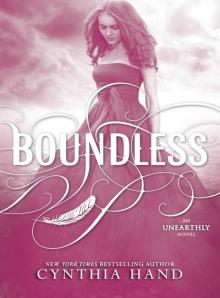 Boundless
Boundless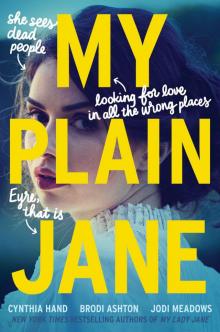 My Plain Jane
My Plain Jane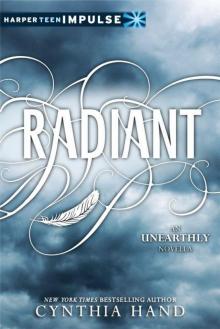 Radiant
Radiant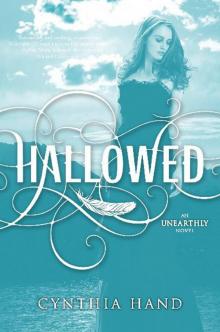 Hallowed
Hallowed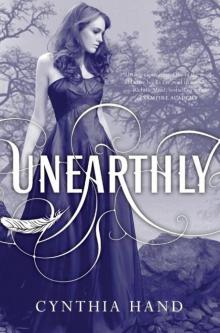 01 Unearthly
01 Unearthly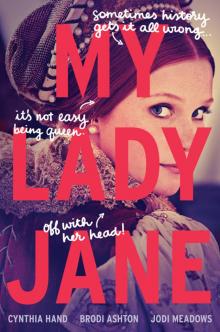 My Lady Jane
My Lady Jane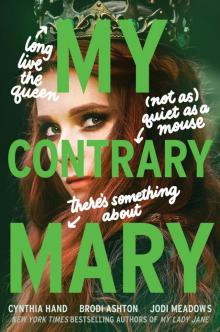 My Contrary Mary
My Contrary Mary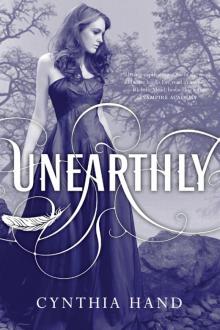 Unearthly
Unearthly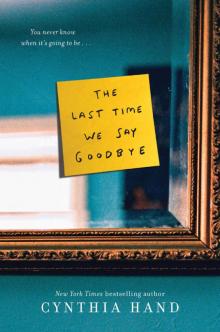 The Last Time We Say Goodbye
The Last Time We Say Goodbye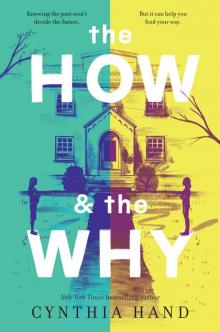 The How & the Why
The How & the Why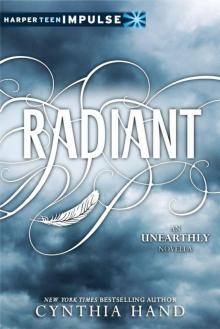 Radiant (HarperTeen Impulse)
Radiant (HarperTeen Impulse)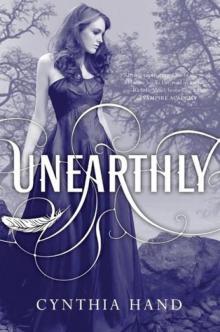 Unearthly u-1
Unearthly u-1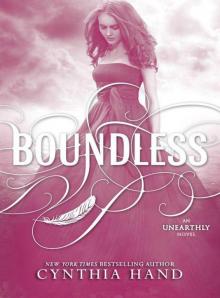 Boundless (Unearthly)
Boundless (Unearthly)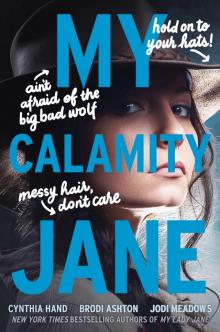 My Calamity Jane
My Calamity Jane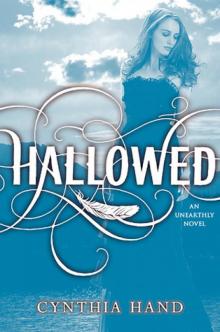 Hallowed u-2
Hallowed u-2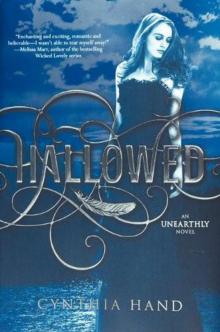 Hallowed: An Unearthly Novel
Hallowed: An Unearthly Novel